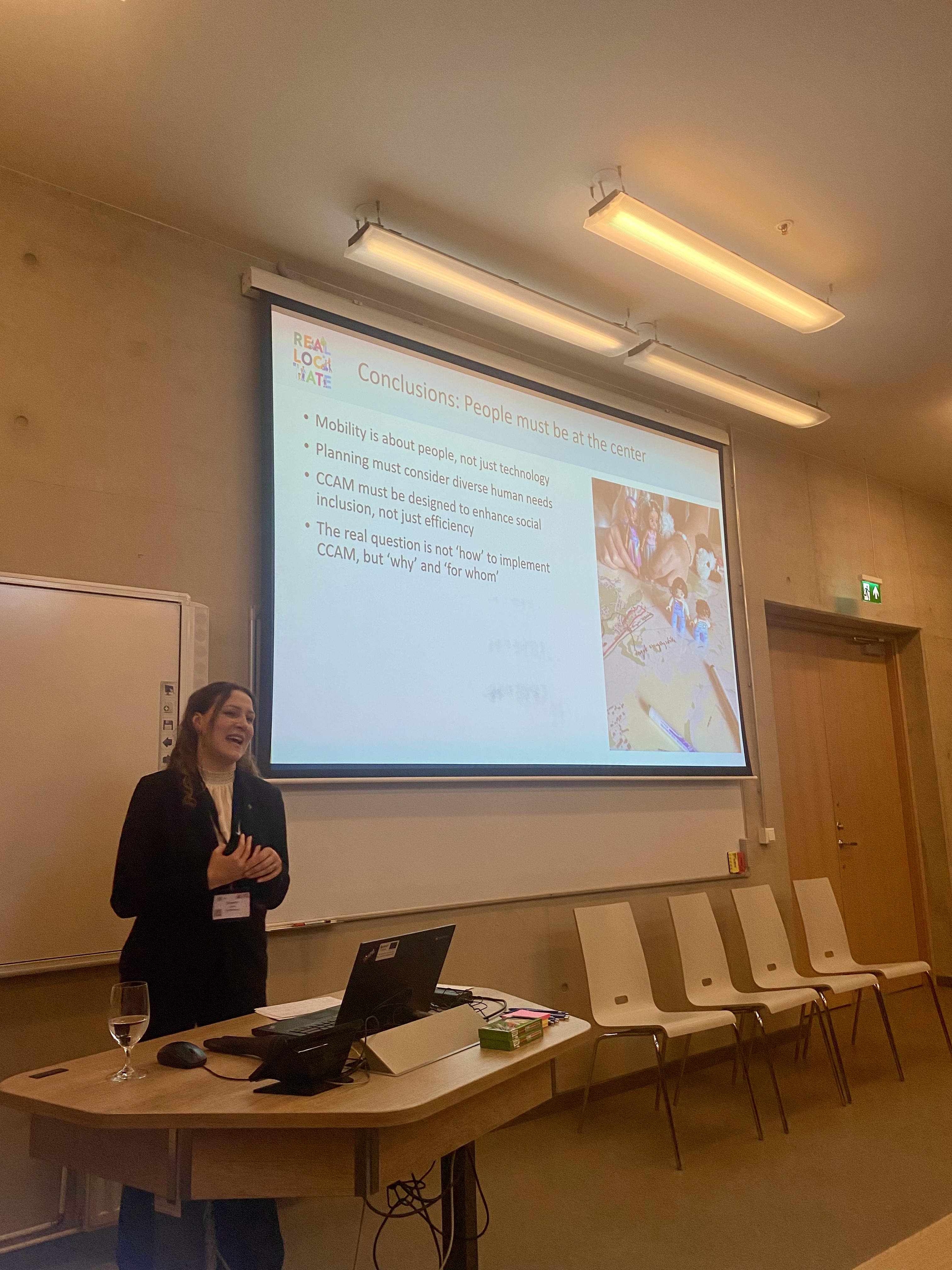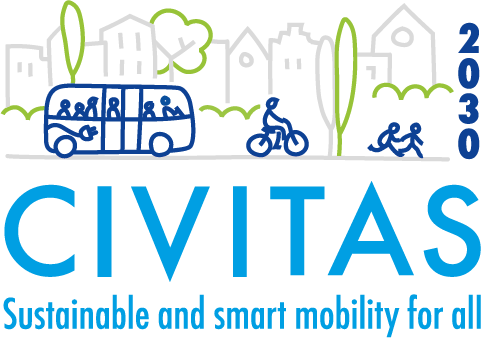
News
Collaborating Beyond Boundaries - Six REALLOCATE cities take part in the Eurocities Mobility Forum 2025 in Riga
11 April 2025
On 19–21 March 2025, the Latvian capital hosted the Eurocities Mobility Forum under the theme ‘Collaborating Beyond Boundaries: Sustainable Mobility for All’. This year’s forum highlighted how European cities are tackling pressing mobility challenges by fostering collaboration, rethinking infrastructure and prioritising equity and sustainability.
Over three days, participants explored innovative solutions to key urban mobility challenges, including shaping low-emission zones, addressing urban logistics, and implementing 30km/h zones and traffic calming measures to create safer streets. The discussions also focused on strategies to improve accessibility in transport planning and harnessing data to enhance decision-making.
Transforming Streets with Traffic Calming Measures, 30km/h Zones and Parking Reform session
REALLOCATE was represented across a few conference sessions and events, one of which was the "Transforming Streets with Traffic Calming Measures, 30km/h Zones and Parking Reform" workshop. It explored innovative strategies to enhance safety and mobility in dense urban intersections where pedestrians, cyclists, children, older adults and people with additional support needs navigate alongside high volumes of vehicular traffic.
Speakers, including Pierre Soulard from Métropole de Lyon and Marko Velzek from City of Zagreb / Grad Zagreb—both REALLOCATE cities—shared insights on reallocating road space and implementing safer street designs.
Pierre Soulard started by presenting Lyon’s comprehensive strategy on street space reallocation and the different tools that the metropole is using to make it a reality. For example, the city has adopted the ‘Ville a 30’ strategy in 24 out of 58 municipalities, and two-thirds of the population are currently living in a zone with a 30 km/h speed limit. However, traffic calming is not enough. Local residents are demanding comfort and quality of public spaces, including more greenery, comfortable pedestrian infrastructure, and secure parking spaces for bicycles. The city is embracing the superblock concept, creating Super-îlot Danton, for example. A new parking policy is being introduced, with pricing based on a car’s weight, size, engine, household size and income, as well as specific tariffication for local commercial activities.
Marko Velzek, Deputy Head of Municipal Governance, Transport and Safety Department in Zagreb, showcased the ongoing redesign of the complex intersection between Selska and Horvaćanska streets, characterised by high levels of traffic. Special attention has been paid to improving pedestrian and cycling infrastructure as well as giving priority to the tram that runs through the intersection. Additionally, the plan is to increase green space. The city is exploring new ideas and planning to prepare for the replication of this project to other locations in Zagreb
Elina Kirilko from Riga City Council presented the planned interventions for their Just Streets pilot in Meža street square in Riga, while Kevin van der Linden from Gemeente Rotterdam showcased the Redesign of the Coolsingel boulevard and introduced the city's new circulation plan.
Common reflections during the session included:
- Parking management plays a central role in redesigning public spaces, but it can also trigger backlash.
- Meaningful citizen engagement remains a challenge, particularly in the case of limited time and resources.;
- Despite the difficult process, cities are moving in the right direction, and change is happening.
CCAM (Cooperative, Connected, and Automated Mobility) session
REALLOCATE was also present in a session on CCAM (Cooperative, Connected, and Automated Mobility), focusing on innovative approaches to user engagement. Suzanne Green from the city of Gothenburg shared details about the REALLOCATE pilot happening in the Bergum-Gunnilse area of the city, alongside insights from other speakers, namely: Sergio Fernandez Balaguer from EMT Madrid, Viesturs Celmiņš from NGO VEFResh, Riga, and Helmut Augustin from the city of Vienna.
The session explored learnings from real-life CCAM pilots, planning for CCAM in public transport, developing a local roadmap for CCAM and the importance of engaging users early in the process to ensure CCAM solutions meet real mobility needs. Driving from experiences in user-centered pilots, including REALLOCATE, it was emphasized that CCAM should not be developed to only focus on technology and efficiency, but also enhance trust, inclusivity, and social acceptance.
“Surveys often suggest time, cost, and convenience drive transport choices—but real-life behaviour often tells a different story. Parents might take a longer driving route with their teenagers, because it’s their only chance to have a conversation with them. It was rewarding to challenge these assumptions and discuss how emotions, trust, and social dynamics shape mobility. The real question is not ‘how’ to implement CCAM, but why and for whom.” – Suzanne Green, City of Gothenburg

The key takeaways from Suzanne’s presentation were:
- Mobility is a social experience.
- Mobility shapes identity & belonging.
- It’s crucial to consider mobility’s emotional and social dimensions, not just efficiency.
30 km/h taskforce session
Finally, the 30km/h speed limit taskforce roundtable discussions brought together a large group of cities: Bologna, Barcelona, Lyon and Budapest from REALLOCATE, which shared with their counterparts some of the challenges related to speed limit reduction.
Budapest focused on the effects of speed reduction on noise pollution, which is under-researched and overlooked, but which has the potential to have a high impact on residents' quality of life while Bologna raised the multifaceted challenges related to governance regarding 30km/h regulation, implementation and enforcement.
Barcelona shared their ongoing assessment of speed reduction strategies (e.g. shared spaces, segregation of modes) according to the different types of streets of the city placing high importance on considering vulnerable users (elderly, children, people with disabilities). Last but not least, Lyon presented their study on the effects of speed reduction strategies on public transport efficiency with one of the proposed solutions being the introduction of priority lanes for public transport.
The event was a great opportunity for some of the REALLOCATE cities to showcase their progress and bring more light to the findings and reflections they’ve developed throughout the project’s lifetime so far.
The integrated approaches discussed throughout the various sessions show how cities can design safer, more inclusive intersections that meet the needs of all users.
Pedestrian crossing in Riga, Latvia (Unsplash) by "Anastasiya Badun"
All news

This project has received funding from the European Union’s Horizon Europe programme under grant agreement No. 101103924. Views and opinions expressed are however those of the author(s) only and do not necessarily reflect those of the European Union or the European Commission. Neither the European Union nor the granting authority can be held responsible for them.


REALLOCATE is a project under the CIVITAS Initiative, an EU-funded programme working to make sustainable and smart mobility a reality for all, and contributes to the goals of the EU Mission Climate-Neutral and Smart Cities.
